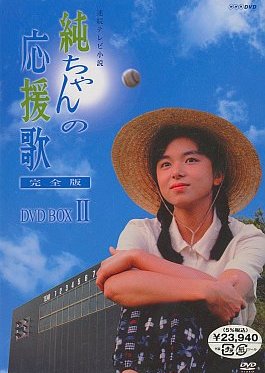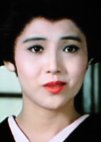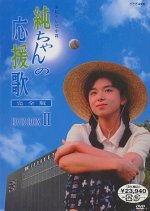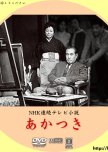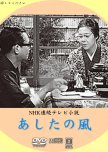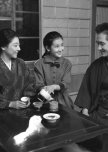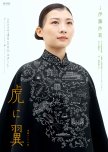- Français
- English
- magyar / magyar nyelv
- dansk
- Titre original: 純ちゃんの応援歌
- Aussi connu sous le nom de: Jun-chan's cheering song
- Scénariste: Hiroichi Fuse
- Genres: Historique, Vie quotidienne, Drame, Guerre
Distribution et équipes
- Yamaguchi Tomoko Rôle principal
- Takashima MasahiroHayami ShuheiRôle Secondaire
- Kawazu YusukeOno Yoichiro [Junko's father]Rôle Secondaire
- Ito EikoOno Aki [Junko's mother]Rôle Secondaire
- Matsumoto YuriOno Kyoko [Junko's sister]Rôle Secondaire
- Nishikawa HiroshiOno Akira [Junko's brother]Rôle Secondaire
Critiques

Cette critique peut contenir des spoilers
'Nice Play'
"Jun-chan no Ouen-ka" is my fourth asadora. I chose the drama since the fansubber had just finished subbing it. You can find the subtitles over at d-addicts by the way. "Jun-chan" was different from the previous asadoras I watched. The key difference being that Junko (played by Yamaguchi Tomoko) is an unambitious heroine. This is not bad, but it does mean that the series does not necessarily have a goal it's working towards. Junko instead focuses on taking care of her family through various ways. The drama therefore feels like more of a family/slice-of-life drama. I liked this kind-of easy-going pace, but I wasn't exactly on the edge of my seat after each episode to find out more.Besides family, "Jun-chan" has a secondary focus of baseball. It links to several of the series major characters and is also the source of the more emotional moments. I'm sure the third to the last episode will get you. Junko's brothers, Akira and Yuta, are the main ballplayers of the series. They are also two of my favorite characters. There is a slightly awkward transition from where they are played by child actors to adult actors. However, I thought the adults were stronger actors so that makes up for it. I particularly liked the adult Yuta (played by Karasawa Toshiaki).
The main storyline in "Jun-chan" is perhaps the romance between Junko and the Japanese-American, Shuhei (played by Takashima Masahiro). I thought these two had strong chemistry and they manage to stay interesting even after getting married. Much of the latter half of the drama is about them working through their marital and childrearing problems. Considering their strong, stubborn personalities, I liked that the writers didn't opt for a "happily ever after"-type marriage.
Now addressing Junko. She's a very low-key heroine in some ways. Junko gets most of her satisfaction out of life by helping others whether it's doing the housework or supporting her family by working at a diner and later an inn. However, she is not portrayed as being perfect. Junko has a bit of a martyr complex and is often stubborn. Her family and loved ones appreciate what she does, but aren't afraid to call her out every now and again. As a heroine, I found Junko very enjoyable to watch. I'll remember her for her bright and never-ending perseverance.
To close out, I chose to title this review "Nice Play" after a pivotal moment in the series. It's used in baseball to indicate "good game" basically. However, one character points out that this could apply to life itself. Junko, her family, and friends each had a "nice play." I enjoyed nearly every minute of the series and I liked that the ending indicates that their lives will go on after the story.
Cet avis était-il utile?
Recommandations
There have been no recommendations submitted. Be the first and add one.

